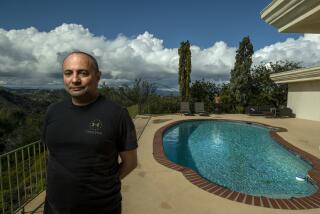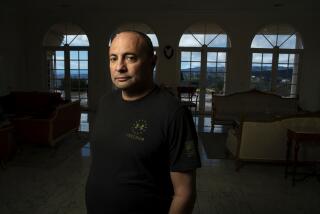Bruised Russian Reformer Back at Helm
- Share via
MOSCOW — Bloodied but unbowed, Anatoly B. Chubais, the architect of Russia’s economic reforms, conceded Tuesday that his authority has been badly damaged by his acceptance of a $90,000 “book advance” many saw as a bribe, but he insisted he has done nothing unethical.
The 42-year-old first deputy prime minister has kept a low profile during the two weeks that the corruption scandal has raged through the Kremlin, costing four key government leaders their jobs and accelerating economic turmoil set in motion by a global stock market tumble.
But in his first interview with Western correspondents since getting caught up in the controversial book affair, Chubais made clear that he has again taken the helm to pilot Russia through the shallows of its post-Soviet transformation and around the new market-buffeting storms that have blown in from Asia.
Chubais has been politically wounded since it was disclosed that he and the four sacked reformers had each accepted $90,000 for an obscure and as-yet-unpublished tome on privatization. The publishing company that paid $450,000 for the book, which analysts say would be unlikely to gross even $10,000, is partly owned by Uneximbank, the successful bidder in several controversial state asset auctions.
Kremlin officials insist that the book deal was made prior to Uneximbank’s purchase of controlling stock in the publishing house. But even Chubais has admitted that the size of the advance was unseemly and that it is hampering his ability to push forward economic reforms.
“It is like being put in a boxing ring against a very tough opponent . . . with your hands tied behind your back and your legs tied too,” he said of the scandal’s hindrance of his fight to pay back $1.6 billion in overdue wages to state employees amid the financial crises.
He also complained that his telephone conversations are being tapped, that his wife and son are being followed by plainclothes security men and that compromising material is being solicited from his friends.
“So far, they haven’t started shooting anyone, but we’ll see,” he said, intimating that those harassing him are former KGB agents now in the employ of prominent industrialists who have turned against him after failing to win attractive share auctions.
Most visible and vocal of Chubais’ many enemies is billionaire tycoon Boris A. Berezovsky, whose bid for shares in last summer’s privatization of the Svyazinvest telecommunications giant was rejected in favor of a higher offer from Uneximbank. That tender, as well as Uneximbank’s success in buying shares in Norilsk Nickel, prompted Berezovsky to complain bitterly through media he controls that Chubais was in league with Uneximbank.
Despite the book fiasco and opposition demands that Chubais be fired, President Boris N. Yeltsin has insisted that his chief economic strategist will stay in power because a change at this crucial juncture could cost the country so dearly. Amid the current instability, the departure of Chubais would prove a further blow to economic recovery and deprive the country of an effective lobbyist with international lending institutions, Yeltsin has argued.
As if to bolster that position, a confident Chubais said he had been assured by an International Monetary Fund mission now visiting Moscow that a $700-million credit suspended in October because of Russia’s poor performance in tax collection will be issued before the end of the year. That relief would also trigger approval of $1.1 billion in World Bank credit held up because of the IMF’s doubts about Russia’s revenue-generating performance.
But a senior official at the Russian White House said Chubais wants to quit his post as soon as the current crisis is stabilized. After five years of burning the midnight oil for an ungrateful population, greedy industrials and garrulous government bureaucrats, the official said, Chubais believes that he has fulfilled his obligations to the new Russia and is eager to move into the private sector he was instrumental in creating.
Chubais indicated that the current financial turmoil has set the country back three to six months in its recovery but argued that the more important accomplishments of taming hyper-inflation, boosting real wages and posting a modest rise in industrial production remain unshaken. Foreign investment in Russia also tripled over the first half of this year compared with the same period in 1996, bringing in $6 billion for new projects.
But Chubais conceded that the slump in stock values on Russian and other emerging markets forced postponement of several major share auctions by key state enterprises, including natural gas giant Gazprom and the huge electricity consortium Unified Energy Systems. Those delayed auctions are depriving state coffers of badly needed revenue to pay back wage debts and prop up the embattled ruble.
A rush to sell rubles for dollars at the Central Bank-supported exchange rate has cost the government $2.5 billion in recent weeks and forced up interest rates for treasury bills. “This is very painful for us, extremely painful,” Chubais said in the interview with a dozen journalists from the United States, Britain, Germany and France.
More to Read
Sign up for Essential California
The most important California stories and recommendations in your inbox every morning.
You may occasionally receive promotional content from the Los Angeles Times.











